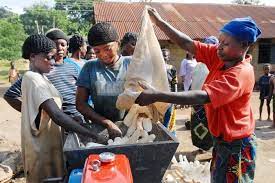The Abuja Enterprise Agency (AEA) has concluded skills acquisition training empowering 163 FCT rural women and youths as part of the strategy to boost rural entrepreneurship in the territory.
The Acting Managing Director of the Agency, Malam Shehu Abdulkadir, made the disclosure at the grand finale of the 2nd edition of Rural Skills Acquisitions and Sensitisation Initiative (RUSASI) training on Thursday in Abuja.
Abdulkadir said that the training was designed to build the capacity of rural communities to produce basic sanitary items such as sanitizers, liquid soaps, and antiseptics as a means of curbing the COVID-19.
Abdulkadir said that the agency also built the entrepreneurial skills of the participants on book keeping, saving culture, customer relations, business planning, marketing, and sales to enable them effectively start and manage their businesses.
“The 2nd edition of RUSASI has also facilitated the acquisition of skills in sectors such as confectionery, disinfectants, organic fertilizers, and others.
“The 163 women and youths were trained in a period of four weeks across four area councils namely: the Abuja Municipal Area Council (AMAC), Kwali, Kuje, and Abaji Area Councils to enhance their capacity to initiate and sustain their business ventures.
“We will support trainees with starter packs and operational grants,” the acting managing director said.
Abdulkadir, therefore, urged all participants to make the best use of the opportunity provided to them by the agency.
He said that the monitoring and evaluation would be conducted to determine participants who would judiciously use the starter packs.
“This will serve as a basis to provide post training support to facilitate the scale-up of their business.
“It is our desire to see all the beneficiaries succeed and build their business acumen. This training if well utilised, will pave the way for many other supports we have planned for MSMEs.”
He said the agency would be implementing Result Area three of the Nigeria CARES project designed to support poor and vulnerable households and SMEs due to the negative impact of the COVID-19 on their livelihood.
“The agency will provide support to vulnerable MSMEs in areas such as co-financed loans, operational grants and technological enhancements for MSMEs.’’
Earlier, Hajia Aisha Babangida, the Chairperson of, Better Life Programme for the African Rural Woman, an NGO, reiterated the desire and determination of the organization to continue to support programmes aimed at empowering the rural women.
Represented by Mr. Solomon Okonkwo, the Programme Manager of the NGO, Babangida, assured that the organization would continue to provide income-generating opportunities for rural women to enhance their economic status.
Responding on behalf of the participants, Hajiya Hauwa Sani, who was trained on disinfectants, thanked the agency and the NGO for building their capacity to the self-reliant.

